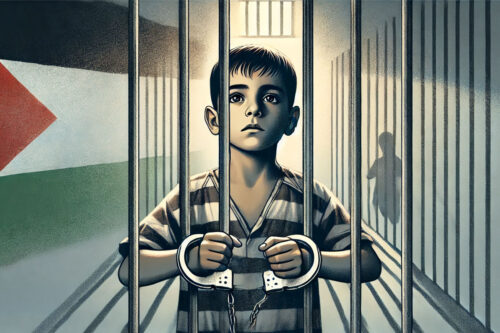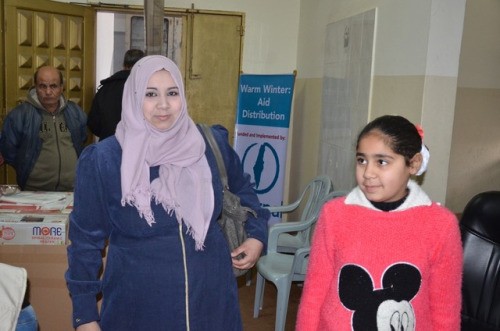Palestinian women’s double burden
Today marks International Women’s Day. On this day, women (and men) around the world gather to mark the progress that the women’s rights movement has made over the years, to call for change and to “celebrate acts of courage and determination by ordinary women who have played an extraordinary role in the history of their countries and communities”.
Because Palestinian voices have been silenced throughout history on the international stage, the extraordinary contribution that Palestinian women have made to their society remains overwhelmingly unrecognised by the world’s media.This is despite their mammoth struggle against both systematic
gender-based violence by the Israeli government and gender discrimination
within their communities (often referred to as a ‘double-burden’).
Gender-based violence is understood as violence against a person based on
their gender:
“It constitutes a breach of the
fundamental right to life, liberty, security, dignity, equality between women
and men, non-discrimination and physical and mental integrity” [fusion_builder_container hundred_percent=”yes” overflow=”visible”][fusion_builder_row][fusion_builder_column type=”1_1″ background_position=”left top” background_color=”” border_size=”” border_color=”” border_style=”solid” spacing=”yes” background_image=”” background_repeat=”no-repeat” padding=”” margin_top=”0px” margin_bottom=”0px” class=”” id=”” animation_type=”” animation_speed=”0.3″ animation_direction=”left” hide_on_mobile=”no” center_content=”no” min_height=”none”][i]
It is widely known that pregnant women are particularly vulnerable during
any kind of armed conflict. Palestinian women, however, face additional risks
on a daily basis due to the on-going occupation.
The lives of Palestinian women have been uniquely impacted by the
decades-long occupation, harsh restrictions on freedom of movement,
mass displacement and frequent military incursions into the occupied
Palestinian territory.
For example, delays in accessing health services because of the network of
military checkpoints and the ‘Separation Wall’ in the West Bank have led to the
deaths of many women in children. Within the space of five years, 67
Palestinian mothers were forced to give birth at Israeli checkpoints, and 36 infants
died.[ii]
In Gaza, medical supplies are at zero-stock levels and hospitals are
severely understaffed. The situation is made worse by Israel’s frequent
military incursions which push hospitals to crisis point. The needs of pregnant
women in hospitals are downgraded during Israeli assaults in order to treat the
wounded, putting women and their unborn children at a higher risk of mortality.
According to some reports, as a result of last summer’s assault
approximately 16 pregnant women were killed and 4 others died due to a lack of
necessary health services. In addition to this, at least 500 women were injured
due to Israeli shelling and displacement. [iii]
The maternal health situation in the occupied Palestinian territories
remains desperate: many facilities and maternity clinics are overwhelmed and
are forced to close.[iv] According
to reports, Al Shifa Hospital in Gaza documented a 15 to 20 per cent increase
in premature births as a result of the stress of the last summer’s
bombardments. [v]
Overall, poverty, poor nutrition, displacement and psychological trauma
all uniquely and negatively impact women’s health, particularly maternal and
infant health. In Article 25 of the Universal Declaration of Human Rights, it states that ‘everyone has the right to a standard of living adequate
to health’. Section 2 of the Article 25 is also dedicated to the specific entitlement
of mothers and children to special care and assistance. Tragically, these
rights are being systematically denied to Palestinian women every single day.
The rights of women cannot be separated from the rights enshrined in the
Universal Declaration, however, we must not forget the gendered way in which
these rights are being denied to Palestinians. Until a political solution is
found, Palestinian women will continue to carry the ‘double burden’ they face
under occupation.
[i]http://eige.europa.eu/content/what-is-gender-based-violence
[ii]http://visualizingpalestine.org/visuals/checkpoint-births
[iii]http://www.al-monitor.com/pulse/en/contents/articles/originals/2014/11/gaza-pregnant-women-lack-medical-services.html#
[iv]
Ibid.
[v]
Ibid.
[/fusion_builder_column][/fusion_builder_row][/fusion_builder_container]
Calculate your Zakat
Confused about how to calculate your Zakat? Try our simple-to-use calculator

![A Shadow R1 spy aircraft operated by the UK's Royal Air Force, accused of supporting the genocide in Gaza [Jerry Gunner / Wikimedia]](http://www.interpal.org/wp-content/uploads/2025/04/1768px-Shadow_R1_5AC_Sqdn_RAF_Waddington_this_morning-e1745166357309-500x333.jpg)

![Fighters from Israel's pre-state militia occupying the village of Deir Yassin, April 1948 [IDF archive / Wikimedia]](http://www.interpal.org/wp-content/uploads/2025/04/Jewish_militias_in_the_village_of_Deir_Yassin_April_1948_cropped_and_edited-e1745166391491-500x333.jpg)
